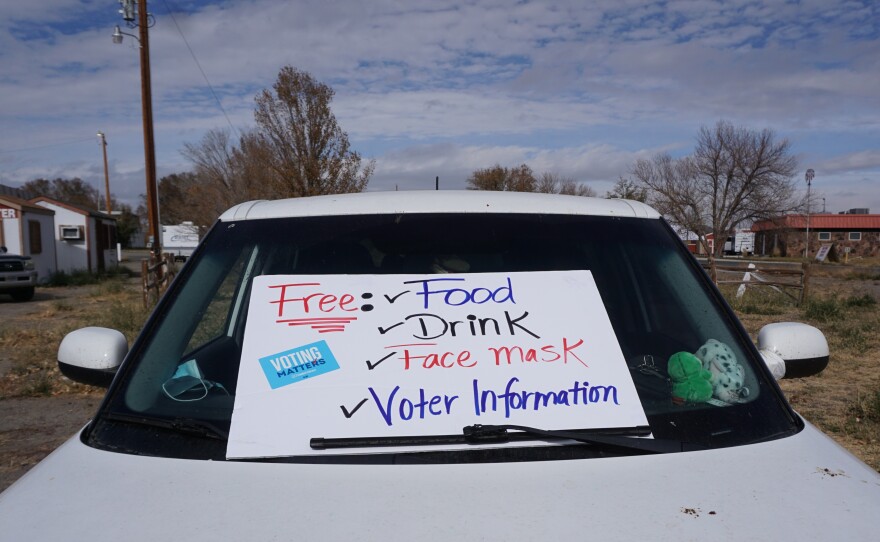Last weekend, as the Wind River Reservation was bracing for snow, Wyoming State Rep. Andi Clifford was squeezing in some campaigning in the parking lot of Great Plains Hall in Arapahoe.
"Normally, we would have been probably inside Great Plains Hall or somewhere at Arapahoe School, maybe in the gym. But we can't. So we're out here," Clifford said.
She's running for a second term representing House District 33, which includes much of Wind River, against Republican Valaira Whiteman and Independent Clinton Wagon. The reservation's public health orders prohibit large, indoor gatherings. So, Clifford and her team have been spending a lot of time outside in the cold.
"We think of our ancestors and what they've gone through under the elements. So, it's a little bit of suffering for a couple of hours, but I don't care," she said.
When two women pulled up in a pickup, campaign volunteers brought them bowls of stew and pieces of frybread. Clifford handed them a voting guide.
"Did you get to vote yet?" she asked, but both women shook their heads no.
Like most voters in Clifford's district, they're planning to wait until election day when they can vote in one of four polling places on the reservation. The only early voting center in Fremont County is the County Clerk's office in Lander. Depending on where you live on Wind River and what the weather's like, that drive can take anywhere from 25 minutes to an hour.
"However I'm encouraging people to go because the coronavirus is at a spike here and I don't want them to be quarantined and not be able to go and vote on November 3," Clifford said.
A week before election day, data from the Wyoming Secretary of State's Office showed that Clifford's constituents had cast about a third as many early and mail-in ballots as voters in the neighboring house district.
"Obstacle on top of obstacle"

Wind River voters are facing what the Native American Rights Fund, or NARF, calls "Tyranny of Distance." Samantha Kelty, an attorney with the non-profit law group said it's a problem that the pandemic has only intensified.
"It's caused worsening economic conditions or loss of jobs, and so when it was hard enough to find enough money for a tank of gas to get to the county seat, now it's just impossible," Kelty said.
Distance isn't the only problem. In a 2018 report called "Obstacles at Every Turn", NARF laid out how strict voter-registration laws disproportionately affect Native people in some places. Poor postal access makes voting by mail a challenge, and a lack of broadband can prevent people from accessing voter information.
This year, NARF worked to secure satellite voting offices on reservations across Montana, where many Native people would otherwise travel two to three times farther than non-Natives to get to the polls.
NARF also helped secure the right of third-party organizations to collect ballots and deliver them to election officials on behalf of tribal members in Nevada and Montana.
'It's just layered. Obstacle on top of obstacle on top of obstacle," Kelty said. "And all of these issues have been ongoing. They just have the spotlight on them now with COVID-19."
Marci Mclean, a citizen of the Blackfeet Nation, heads up an advocacy organization called Western Native Voice has been collecting ballots on behalf of tribal members as part of its effort to get out the Native vote in Montana. She said that tool, along with satellite election offices, have been key during the pandemic.
"The way the virus is taking over in our communities, I hope people are being safe. And I think one of those precautions should be staying home and not going to an election office," Mclean said. "Especially if it's outside of our tribal nation."
Challenges in Fremont County
There have never been early voting centers on the Wind River Reservation. In past years, there has been one in Riverton, which has a larger and more diverse population than Lander. It's also a shorter drive from some communities of the reservation, including Arapahoe and Kinnear.
This year, Fremont County Clerk Julie Freese said she doesn't have enough staff or security resources to keep the Riverton office open for early voting.
"With the increase in absentee balloting, it's taking a lot more of my people's time here," Freese said, adding that the pandemic has driven an increase in land and vehicle sales for her office to process. "We're doing a lot of comp time in this office just trying to keep up."
For now, Freese said her hands are tied by state staffing and security requirements.
"Can those be changed by legislation? Yeah, maybe, I think we can look at some of [the challenges] that have come up through COVID," she said. "But I don't see any way I can do early voting on the reservation at this time."
Meanwhile, community spread of COVID-19 has reached an all-time high on the Wind River Reservation and Fremont County as a whole. According to Dr. Paul Ebbert of the Northern Arapaho Tribe's clinic, as many as 300 tribal members could be under quarantine orders on election day. Ebbert and Freese agree that the best way for those people to cast their ballots is to call the Fremont County Clerk's Office and arrange to vote curbside.
To her constituents who are nervous about contracting the virus at the polls, Rep. Clifford said there's one more opportunity to make the drive to Lander before election day.
"Go vote early. Vote now. Just in case you do come down with the virus," Clifford said. "We're all about protecting our elders, protecting our people, family and friends with underlying health conditions. [Voting early] is going to be very crucial."
Have a question about this story? Contact the reporter, Savannah Maher, at smaher4@uwyo.edu.









